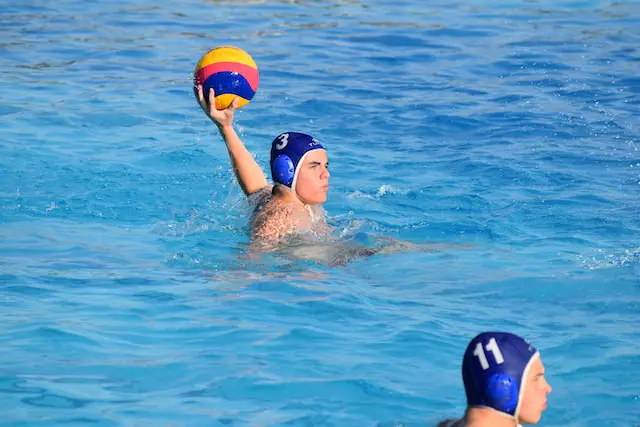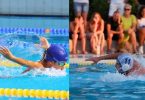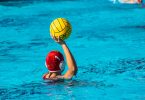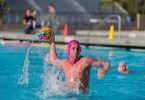If you’re interested in playing water polo, you may be wondering when you can start. The good news is that anyone can start playing water polo at any age, provided they know how to swim.
In fact, many people don’t start playing until they’re teenagers or adults, and still go on to become successful water polo players.
It’s important to note that while you can start playing water polo at any age, the earlier you start, the better. This is because water polo requires a variety of skills, including swimming, passing, shooting, and treading water. The more time you have to develop these skills, the more successful you’re likely to be on the water polo field.
So, whether you’re a young child just learning to swim, a teenager looking for a new sport to try, or an adult who’s always been interested in water polo, there’s no time like the present to get started. With dedication, hard work, and a love for the game, you can become a successful water polo player at any age.
Age and Skill Requirements
Age Requirements
Water polo is a physically demanding sport that requires a high level of skill and endurance. While there is no minimum age requirement to start playing water polo, it is recommended that children start at a young age to develop the necessary skills and techniques.
Some water polo clubs and programs may have minimum age requirements, so it is important to check with your local club or program.
USA Water Polo suggests that children as young as 4 or 5 years old can begin to play water polo. Initially, the sport may resemble swimming lessons, but it will eventually evolve into a complete game that your child will enjoy. In reality, there is no age limit for water polo, and anyone who knows how to swim can participate.
Skill Requirements
Water polo necessitates a combination of swimming, ball handling, and teamwork abilities. Players must be able to swim efficiently and have good stamina to keep up with the fast-paced nature of the game. They must also be able to handle the ball with precision and accuracy, as well as make quick decisions under pressure.
It is important to note that water polo is a contact sport, and players must be able to handle physical contact and play within the rules of the game. Players must also be able to work well with their teammates and communicate effectively to ensure a successful game.
While it is possible to start playing water polo at any age, it is important to develop the necessary skills and techniques to ensure a safe and enjoyable experience.
Beginners may want to consider taking lessons or joining a beginner’s program to learn the basics of the game before joining a more competitive team.
Equipment and Facilities
Before you can start playing water polo, you need to have the right equipment and facilities. Here are the essential items you need:
Water Polo Ball
The water polo ball is the most important piece of equipment you need. It is a specially designed ball that is slightly smaller than a basketball and made of waterproof material.
The ball is usually yellow, and it has a rough texture to make it easier to grip in the water. You can buy a water polo ball at most sporting goods stores or online.
Pool or Water Facility
You need a pool or water facility to play water polo. The pool should be at least 25 meters long and 20 meters wide, with a depth of at least two meters.
The water should be clear and clean, with a temperature of around 26-28 degrees Celsius. You can find water polo facilities at most community centers, YMCA’s, or other public pools.
Swimwear and Gear
You need to wear the right swimwear and gear when playing water polo. Men usually wear swim trunks or briefs, and women wear one-piece swimsuits.
Both men and women wear swim caps to keep their hair out of their eyes and a mouthguard to protect their teeth. You can also wear earplugs to protect your ears from water pressure.
Water polo players also wear special caps that have ear protectors and a chin strap to keep the cap in place during the game. The caps are usually color-coded to show which team each player is on. You can buy water polo caps and other gear at most sporting goods stores or online.
Training and Coaching
Training Programs
When it comes to starting water polo, it’s important to have the right training program in place. A good training program should include a mix of conditioning, strength training, and skill drills to help you become a well-rounded player.
Conditioning is a key component of any water polo training program. You’ll need to have strong endurance and be able to swim for extended periods of time.
This means doing plenty of laps in the pool, as well as incorporating other forms of cardio into your routine, such as running or cycling.
Strength training is also important for water polo players. You’ll need to have strong legs for treading water and explosive power for quick movements in the pool. Some good strength training exercises for water polo include squats, lunges, and plyometric exercises like box jumps.
Finally, skill drills are essential for improving your water polo game. This includes practicing passing, shooting, and defensive techniques. Your training program should include plenty of time for practicing these skills, both individually and as a team.
Coaching Staff
Having a good coaching staff is also important when starting water polo. Look for coaches who have experience playing and coaching the sport, as they will have the knowledge and expertise to help you improve your game.
Apart from experience, effective communication is also an essential quality that good coaches must possess. They should be able to provide clear instructions and feedback, as well as be approachable and open to questions from their players.
Another important factor to consider when choosing a coach is their coaching style.
Some coaches are more hands-on and directive, while others take a more collaborative approach. Think about what kind of coaching style works best for you and look for coaches who align with your preferences.
Overall, finding the right training program and coaching staff is essential for starting water polo. By focusing on conditioning, strength training, and skill drills, as well as working with experienced and effective coaches, you can set yourself up for success in this exciting and challenging sport.
Competitions and Leagues
So, you want to start playing water polo? Great! Once you have learned the basics, you may want to start participating in competitions and leagues. Here are some options:
Local Leagues
Your local community center or swimming pool may offer water polo leagues for beginners. These leagues are usually open to players of all ages and skill levels. They are a great way to get started with the sport and meet other players in your area. Check with your local pool or community center to see if they offer any water polo programs.
Regional and National Competitions
If you are looking for more competitive play, you may want to consider regional or national competitions. These competitions are usually organized by governing bodies such as USA Water Polo. They are open to players of all ages and skill levels, but the competition can be fierce.
Regional competitions are a great way to test your skills against players from neighboring states or regions. National competitions, on the other hand, are the pinnacle of water polo competition in the United States. They attract the best players from across the country and offer a chance to compete at the highest level.
Keep in mind that regional and national competitions require a higher level of commitment and skill. You may need to try out for a team or be invited to participate. You will also need to travel to different locations for competitions, which can be expensive.
If you are interested in participating in regional or national competitions, check with your local water polo club or USA Water Polo for more information.







